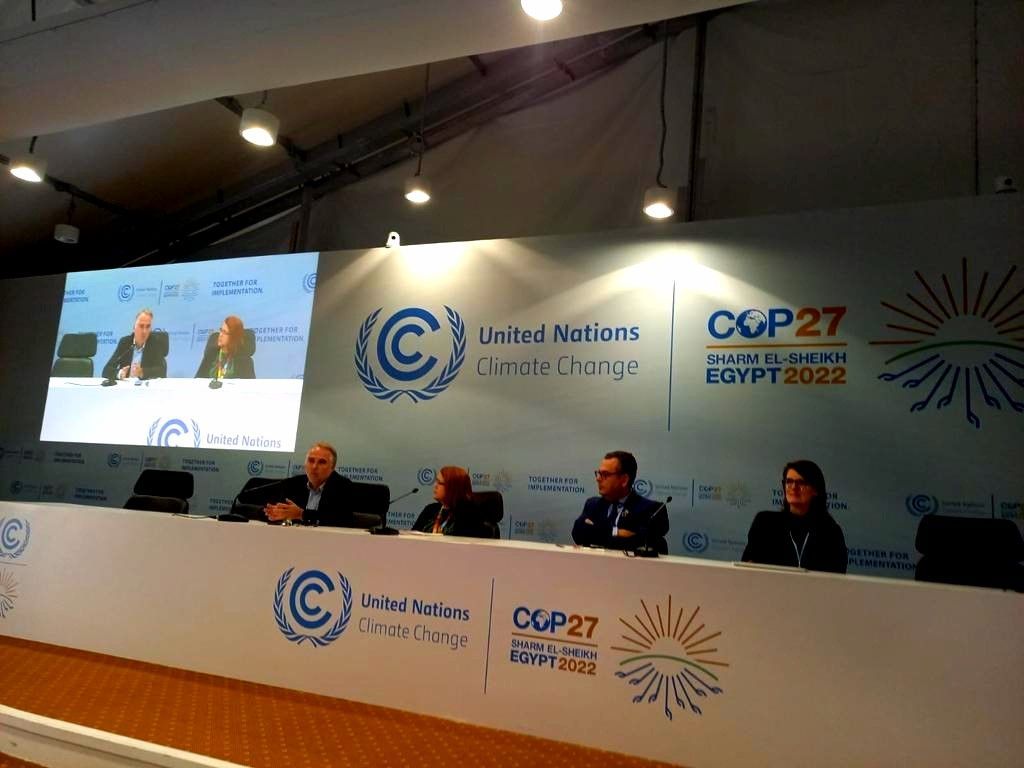The Vision and Role of the UIC for COP28
François Davenne
General Director UIC (International Union of Railway)

Let’s start from the beginning: What are COP meetings and what is their importance for the rail sector?
(Climate negotiation, the opportunity to shape/influence global dialogue on climate/sustainability)
COP, or the Conference of the Parties, refers to the annual conference held under the United Nations Framework Convention on Climate Change (UNFCCC) to bring together representatives of countries to discuss and negotiate action to address climate change. It seeks to assess the measures and strategies taken by the parties to mitigate climate change according to the framework and targets outlined by the UNFCCC.
COP is an important date in the calendar for the rail sector, as it offers an opportunity to shape global dialogue surrounding the climate. This is in order to influence policy and contribute to and benefit from sustainable development initiatives. The discussions and agreements reached at these conferences can drive investment, support policy and innovation, and thereby facilitate systemic transformation to a low-carbon and resilient transport system.
What role does the International Union of Railways play in advocating for the inclusion of railways in climate policies and strategies? And what is your message to the global community?
The International Union of Railways (Union Internationale des Chemins de fer or UIC) is a global organisation that brings together railway companies, infrastructure managers, and industry stakeholders from around the world, whose primary objective is to promote and develop the rail sector globally. As an observer non-government organisation to the UNFCCC, UIC actively engages with international organisations, governments, and stakeholders to emphasise the role of railways as a sustainable mode of transport. It advocates for policies that recognise and support the benefits of rail in mitigating climate change, reducing carbon emissions, and achieving sustainable mobility, by providing technical expertise, data, and best practices to demonstrate the environmental advantages of rail and its potential to contribute to achieving climate goals.
The latest IPCC reports show urgent need for action, with the alarming estimate that, to remain below 1.5 degrees of global warming, transport emissions must fall by 59% by 2050, or by 29% for a 2-degree global warming scenario, relative to modelled 2020 emissions. The conclusion is that systematic change is required and that through a balanced, intermodal application of ‘Avoid, Shift and Improve’ measures, it will be possible to meet the targets for reduced transport emissions. Rail plays a key role in decarbonising transport and fostering a more sustainable future as a whole. While rail represents 7% of global passenger and 6% of freight transport activity, it only accounts for 1% of the transport sector’s total emissions. While global greenhouse gas emissions from the transport sector are continuing to rise, accounting for 14% of all emissions in 2018, rail is the only mode to actually reduce its emissions, down by 2% between 2000 and 2008. UIC collaborates with the sustainable transport community globally to strengthen the voice of rail in transport and climate change discussions. It not only participates in COP meetings, but also in other international platform sessions to raise awareness about the importance of rail transport in helping to achieve global climate targets and encourages the integration of railways into multimodal transport systems.
UIC’s message to the global community is clear: as the cleanest and greenest mode of high-volume transport, the railway sector has a leading role to play in decarbonising transport and achieving the general targets outlined in the Paris Agreement. UIC and its members are focused on working to promote rail as part of the solution to sustainable development challenges, as well as finding ways to make our railways even cleaner and greener.
Could you elaborate on some of the successful initiatives or projects undertaken by the International Union of Railways that have demonstrated the positive impact of participating in past COP meetings?
UIC has historically participated in COP meetings, with a high profile initiative being the Train to COP, whereby delegates, activists, and other stakeholders were invited to arrive at the COP meetings in Copenhagen (2009), Paris (2015) and Glasgow (2021) by train. This enabled the participants to reduce their emissions from travelling while engaging in workshops and debates on route.
In terms of more recent participation, one of the successful initiatives launched by UIC at COP27 was the More Trains campaign, which works to illustrate the rail sector’s contribution to achieving carbon-neutral transport and provides concrete, implemented examples. The More Trains campaign, supported by the UIC Sustainability Taskforce and Platform, has also released the “Next Stop 2030: The sustainable mobility we want” report, showcasing best practices from rail companies in successfully transforming cities, innovating, and decarbonising, while seamlessly connecting different modes of transport. UIC’s impact at COP is clear, as there has been a noticeable shift from the previous year, from a ‘blind focus’ on electric cars to a much broader debate around inclusive mobility and the need for a modal shift in public transport.
Last year’s COP also brought about the launch of the Low Carbon Transport for Urban Sustainability (LcO2TUS) presidency initiative, which aims to decarbonise urban mobility worldwide. Additionally, the Sustainable Urban Resilience for the Next Generation (SURGe) project was launched, aiming to build on the commitments made by cities and provide a holistic framework to create sustainable and resilient urban mobility systems. UIC was a key stakeholder in the LcO2TUSinitiative’s conception and development, and now co-leads the capacity-building workstream, engaging with Walk21 and UITP to make further progress in the run up to COP28.
Finally, COP27 also offered an opportunity to consolidate current and forge new partnerships. The UIC delegation held several bilateral meetings with other transport association, and international organisations, as well as multilateral sessions with development banks, which led to the creation of collaborative projects, such as the work on interoperability in cooperation with the African Union Commission for Energy and Infrastructure.
These initiatives and projects undertaken by UIC have effectively demonstrated the positive impact of engaging in past COP meetings, by highlighting the environmental advantages of rail transport, showcasing best practices, fostering collaboration, and influencing policy discussions to include railways as a crucial element of sustainable transportation systems.
What can we expect to see and hear from UIC in Dubai this year for COP28?
This year, UIC is building on last year’s ‘key asks’ from the More Trains campaign, this time focusing on both ‘clear targets’ and ‘investments.
For investments, UIC is working on unlocking rail project green financing in low- and middle-income countries. A report, which is being developed in partnership with the Birmingham Centre for Railway Research and Education, ALSTOM, and the World Bank, aims to identify potential mechanisms for overcoming the key obstacles and challenges surrounding green and climate finance and railway projects in these countries.
Additionally, UIC has partnered with UITP and Walk21 to conduct a study on Nationally Determined Contributions (NDCs), whereby countries lay out their climate change mitigation strategies and targets. This is a key mechanism of the Paris Agreement. Based on the analysis, recommendations will be given within the report to provide guidelines for countries on the key steps to having a more comprehensive NDC for active travel and public transport.
UIC will also develop communication materials based on the two deliverables mentioned above and invites the entire rail community to support and share their key messages during COP28, while ensuring that rail’s voice is heard in dialogue on climate change. A series of events are also being planned at COP where we will be sharing the outcomes.
How does the railway sector’s commitment to reducing greenhouse gas emissions align with the broader goals of the Paris Agreement and other international climate frameworks?
In 2015, UIC released the Railway Climate Responsibility Pledge, a document signed by the CEOs of rail companies, who committed to:
- Reducing company specific energy consumption and CO2 emissions
- Achieving carbon neutrality by 2050
- Contributing to the United Nations Sustainable Development Goals
Companies are invited to sign the UIC pledge, and demonstrate their alignment with the Paris Agreement and other international climate frameworks’ broader goals. To date, 39 of our members have signed, and are therefore taking concrete action.

What opportunities do you see for the railway industry to further increase its contribution to climate change mitigation efforts on a global scale, and how can international cooperation through COP meetings facilitate this?
For the railway industry to increase its contribution to climate change mitigation efforts, cooperation is essential. UIC recognises this and has developed numerous projects to help foster collaborative work. The first is the Rail Sustainability Index (RSi), a standardised framework designed to help members develop their reporting capabilities. It not only offers the UIC member companies an online benchmarking tool, but also an opportunity to share best practices. The results of last year’s report are uplifting, as they indicated that within the rail sector: 59% of RSi reporting company energy came from renewable sources and that, among the RSi reporting companies, more than 290GWH of energy were saved over the last 3 years.
UIC has also developed the Traction Energy and Emissions Database. This promotes cooperation by collecting data on energy consumption and emissions from railway undertakings to monitor the railways’ performance towards the decarbonisation targets set by UIC and CER for 2030 and 2050. The data has shown how sustainable rail really is, as the energy consumption of both passenger and freight trains has decreased considerably. With regards to air quality, this collaborative approach to data collection has also shown that the rail sector exceeded the 2030 targets it set itself.
Overall, international cooperation through COP meetings can provide a platform for knowledge sharing, collaboration, and policy coordination between countries to support the railway industry's efforts to mitigate climate change. By leveraging these opportunities and fostering global cooperation, the railway sector can enhance its contribution to reducing greenhouse gas emissions, promoting sustainable transport, and achieving the climate goals outlined in international agreements.
We know that the climate agenda goes hand-in-hand with a broader sustainability agenda- is the UIC exploring these topics as well?
There are many different topics that intersect broader sustainability goals, with UIC launching initiatives to address these topics. The first example being gender equality in the rail sector, via a project dedicated to improving the participation and experience of women using and working for rail services, through best practice sharing, training, and advocacy.
The second is nature-based solutions and biodiversity. UIC is an active participant in the sustainable land use and biodiversity agenda, having played a key role in the EU-funded BISON project, which focused on making transport infrastructure more resilient to the effects of climate change and reducing its impact on biodiversity.
The final example I have for you is on the topic of health. The Traction Energy and Emissions Database also tracks total particulate matter (PM) and nitrogen oxide (NOx) emissions, thereby monitoring the impact of the railways on air quality and continuously increasing the drive to emit less pollutants.
These are just a few examples of how UIC is displaying the work that rail companies are undertaking to promote a holistic and integrated approach to sustainability and contribute to the UN SDGs.
Finally, what is your ideal outcome for this meeting and how can companies in the rail sector support UIC in their efforts?
One of UIC’s main goals for COP28 is to strengthen commitment to fighting climate change, and to see increased financial support, policy alignment, technological collaboration, and enhanced knowledge sharing. Railways are the most sustainable mode of transport, and therefore it is vital to disseminate information regarding how rail expansion is a climate solution and will help curb greenhouse gas emissions. This objective has been integrated by UIC into its More Trains campaign, which is working to link partners and stakeholders across the global railway community to increase the sector’s coordination and visibility, while also strengthening rail’s collective advocacy efforts. By working together, the rail sector and UIC can contribute to the success of COP28 and accelerate global climate change action.
Lives & Interviews
Technical Expertise by Vibrer Optic Sensing and Artificial Intelligence by Sensonic
Deep Desai - CCO Sensonic






